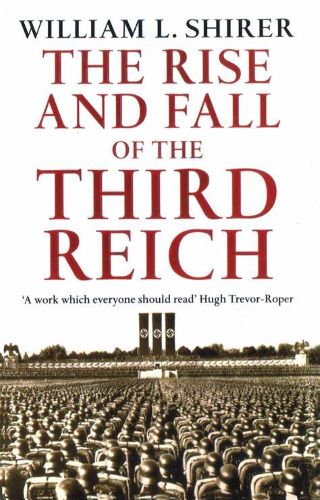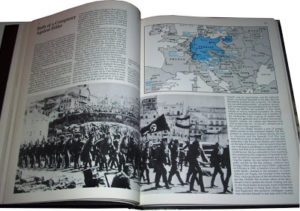The Rise And Fall Of The Third Reich
Author : William Shirer
Genre : History

World War II. The deadliest war in human history with more than 70 million deaths.4

Holocaust. Deadliest genocide in human history with 11 million deaths and two-thirds of European Jews exterminated under Hitler’s Final Solution.
Many questions beg an answer. Why did all this happen? Why was Hitler so viciously anti-Semitic? How could the then German people elect and celebrate such a mass murderer? What led such a powerful, and equally evil, empire to finally lose its sheen? And what lessons do we learn from this barbaric experiment?
Shirer, a journalist, writes this bestselling classic of the Nazi era and World War II, taking us through the rise and eventual fall of The Third Reich (Nazi Germany, the third empire in Germany).

The book starts with deep insights into the Fuehrer’s formative years. His difficult childhood (born the third child of his father’s third wife); his ridicule of the academic gentry (Hitler called most of his teachers “slightly mad”, “mentally deranged” and “absolute tyrants”); his conversion to national fanaticism through the ideas of a history professor; and even as a boy, his “sudden bursts of hysterical anger against those who disagreed with him”. His neurotic love affair with his young half-niece, Geli, “the only woman he had ever loved”, ended with her committing suicide and Hitler getting into depression.
Why did he hate the Jews so viciously? “One of the roots of Hitler’s antisemitism may have been his tortured sexual envy.” The young Hitler had no relations with women while he had “nightmare vision of the seduction of hundreds of thousands of girls” by Jews. But perhaps that is too simplistic a notion. That was also the period of deep class divide and resentment where the average German, including Hitler, lived in poverty while most Jews lived a luxurious life.
His deep frustration and misery when Germany, the Fatherland, lost the First World War (Hitler was then a decorated soldier apparently capturing 15 English soldiers single handedly) plunged him into politics. He, as many Germans, blamed the “stab in the back” to the German army, hated the Jews for campaigning against the war and considered it a national shame that Germany had to make massive reparations to the victors. [Read Keynes’ The Economic Consequences of Peace where the famous economist lambasts the Allied victors of First World War on asking for such huge reparations, plunging Germany in economic chaos and, indirectly, leading to a reactionary regime in Germany]

Hitler’s political initiation is also visible: he understood that Social Democrats were successful because they knew how to create a mass movement, they had learned the art of the propaganda, and finally they knew the value of “spiritual and physical terror”. These were lessons he would use to build the entire Nazi engine. The Nazi party’s birth is chronicled starting with Drexler’s My Political Awakening which greatly influenced Hitler; to how Hitler usurped all power in the party as Supreme Leader and created a brilliantly efficient engine; how he, “with his rowdy manners and violent outlandish extremism was still considered a joke” polling less than 3% of all votes in 1928; but how he considered himself as a rare combination of politician and thinker, a hero of an epoch.
And then came the Great Depression, unemployment and economic chaos. Hitler promised to revive the economy and by 1933 had polled 37% of the votes, became the single largest party, and was made Chancellor. He quickly consolidated power and within a year became Fuehrer and established a brutal totalitarian regime. All other political parties were banned, Nazi party and German government became one, all opposition within his own party was violently eliminated in the Night of the Long Knives, and communists and far-right and Jews and all others slowly exterminated. Heil Hitler replaced Hello in ordinary telephone conversations and Hitler’s auto-biography Mein Kampf became a national best-seller with 12 million copies.

Did this ultra-nationalism help Germany? Hitler boasted the Third Reich will endure for a thousand years. But it lasted only twelve, “raising the German people to heights of power they had not known in more than a millennium… and then plunging them to the depths of destruction and desolation”. The Second World War started with Nazi Germany’s invasion of Poland in 1939, and over the next 2 years, Germany, with the help of Soviet Union, had conquered most of continental Europe. We also realize how appeasement or negotiations with such regimes just do not work, you end up playing into their hands.
However, Hitler then fell foul with Stalin (“the great cold-blooded Nazi blackmailer had met his match (in Stalin)” and committed the fallacy of invading the vast Soviet Union leading to eventual defeat of the once great Nazi empire. The last days of Hitler leading to his suicide in a bunker make up for poignant reading, and the last part of this massive 1500 page book.
Why should you read the book: Is Nazi Germany and second world war history still relevant? With the world becoming increasingly intolerant and jingoistic, with communities blaming each other for their woes, with religious and national fanaticism and extremism on the rise, it may be just the right time to refresh our memories. Hitler promised the supremacy of the pure Aryan race, but unwittingly led to the defeat of the very ideals he claimed to profess. More importantly, ordinary people gave in to the crass temptation and became his blind followers, allowing Hitler to indulge them in their age-old prejudices, only to be eventually led to destruction. Remembrance of this past may lead to better understanding of the present. The sorry lament of a German clergyman should alert us:
“First they came for the Communists, and I didn’t speak up because I wasn’t a Communist.
Then they came for the Jews, and I didn’t speak up because I wasn’t a Jew.
Then they came for the trade unionists, and I didn’t speak up because I wasn’t a trade unionist.
Then they came for the Catholics, and I didn’t speak up because I was a Protestant.
Then they came for me, and by that time no one was left to speak up.”
Goodreads Link: The Rise and Fall of the Third Reich: The History and Legacy of Nazi Germany under Adolf Hitler by Charles River Editors | Goodreads

 This information will never be shared with third party
This information will never be shared with third party
Great review Nishant. To this day, i still try to understand how an entire nation could fall into such disgrace and wonder whether in today’s world, there are lessons we can learn.
To read about Hitler’s rise and fall is to know or revise the history of the world, the forces working, the economic and great depression of early thirties.
I am hardly a person to say much due to lack and limitation of my mental faculty. However I know this much that in the present day of the world the same forces are reviving.
In India specifically, it is even more evident. The isolation of the Muslims and the Dalit. Attempts are being made to convince us that they are responsible for all miseries. The undeclared censorship and false propaganda of progress when unemployment and other serious problems are raising its head. The support of corporate personality, as in the case of Hitler, is seen with naked eyes.
It appears that the present forces are a duplication of Nazi Germany and they have read and made Hitler as there idol.